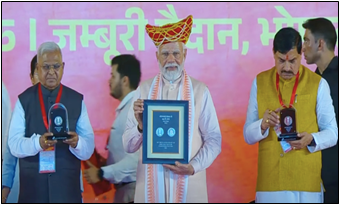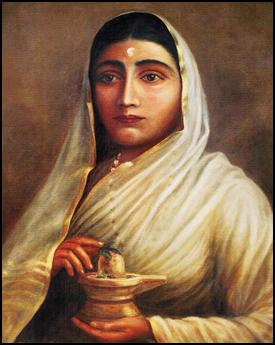Culture & Tourism
Lokmata Devi Ahilyabai Holkar
The Warrior, The Reformer, The Rajmata
Posted On: 31 MAY 2025 5:32PM
Introduction
On May 31, 2025, on the occasion of the 300th birth anniversary of Lokmata Devi Ahilya Bai Holkar, Prime Minister Shri Narendra Modi inaugurated and laid the foundation stone of multiple development projects in Bhopal. Further, the government released a commemorative postage stamp, and a special coin dedicated to Devi Ahilyabai. The Rs 300 coin will feature a portrait of Ahilyabai Holkar. The National Devi Ahilyabai Award was also presented to a woman artist for contribution in tribal, folk, and traditional arts.

On September 20, 2024, the Prime Minister also launched ‘Punyashlok Ahilyadevi Holkar Women Startup Scheme’, in which early-stage support will be provided to women-led startups in Maharashtra. Financial assistance up to ₹25 lakh will be provided under the scheme. 25% of the total provisions under this scheme will be reserved for women from backward classes and economically weaker sections as specified by the government.
Life History of Ahilyabai Holkar

Rajmata Ahilyabai Holkar was the Holkar Queen of the Malwa kingdom. She is regarded as one of the most visionary female rulers of India. In the 18th century, as the Maharani of Malwa, she was instrumental in spreading the message of dharma and propagating industrialization. She is widely known for her wisdom, courage, and administrative skills.
Born on May 31, 1725, in the village of Chondi in Jamkhed, Ahmednagar (Maharashtra), Ahilya hailed from a very humble background. Her father Mankoji Rao Shinde was the village head, and he taught her to read and write. As a young girl, the combination of her simplicity and strength of character caught the attention of Malhar Rao Holkar, the Lord of the Malwa territory. He was so impressed with the young Ahilya that in 1733 he got her married to his son Khanderao Holkar.
Twelve years after her marriage, her husband Khanderao died during the siege of the Kumher Fort. Ahilyabai was so grief-stricken that she decided to commit sati. It was her father-in-law, Malhar Rao who prevented her from taking such a drastic step. Instead, he took her under his wing and trained her in military and administrative matters.
Her father-in-law, Malhar Rao passed away in 1766, and in the following year, she lost her son, Male Rao. She did not let the grief of losing her son overwhelm her. Keeping in mind the welfare of the kingdom and her people, she petitioned the Peshwa to allow her to take over the reign of Malwa. Although some of the nobles objected to this, she still had the support of the army, who had full faith and confidence in her, as she was well trained in military and administrative matters. On many an occasion, she had led the army from the front and fought like a true warrior. In 1767, the Peshwa granted Ahilyabai permission to take over Malwa. She ascended the throne and became the ruler of Indore on December 11, 1767.
Her Rule and Governance
Ahilyabai took control of Malwa after her husband's death in the battle of Kumher in 1754. She then laid the foundation of the indomitable Holkar army in 1792 and became one of the most feared archers of her time.
Maharani Ahilyabai ruled over Malwa in a just, wise, and knowledgeable manner. Under Ahilyabai’s rule, Malwa enjoyed relative peace, prosperity, and stability, and her capital, Maheshwar, was turned into an oasis of literary, musical, artistic, and industrial pursuits. Poets, artists, sculptors, and scholars were welcomed into her kingdom, as she held their work in high regard.
She held daily public audiences to help redress the problems of the common man. She proved to be not only a capable ruler but also a guardian and guide for her people. Her governance extended well beyond Indore, and her initiatives were reflective of both compassion and foresight.
Contributions for Building the Nation
Ahilyabai also established a textile industry in Maheshwar, which today is very famous for its Maheshwari sarees. She turned her attention towards various philanthropic activities, which ranged from the construction of temples, ghats, wells, tanks, and rest-houses in the north to pilgrimage centres in the south. Her most notable contribution was the renovation and repair of the famous Kashi Vishwanath Temple in 1780. Recognizing this contribution of hers, a statue of Devi Ahilyabai Holkar has been installed in Kashi Vishwanath temple. Devi Ahilyabai is also credited for the construction of Old (Juna) Somnath temple in Gujarat. Interestingly, this temple is popularly known as the Ahilyabai temple. This temple was reconstructed recently and was inaugurated by the Prime Minister on August 20, 2021.
With a keen interest in religion and charity, she built numerous temples including two of the twelve Jyotirlingas. Her charity extended beyond her territory to the rest of India. Respected historians have sung her praises in their books.
Ahilyabai initiated the construction of roads and rest houses across India and restored temples at pilgrimage sites like Haridwar, Kashi, Somnath, and Rameshwaram. Her vision, however, extended beyond religion — she supported farmers and expanded trade. Understanding the importance of education, she established many gurukuls and schools. In a revolutionary move for her time, she formed a women’s army and trained them in warfare, self-defense, and administrative security. This force came to symbolize state defense, law and order, and women’s empowerment.
Conclusion: Legacy of Ahilyabai Holkar
The ‘Philosopher Queen’ as she is famously known, passed away on August 13, 1795 at the age of seventy. Her legacy still lives on and the various temples, Dharamshalas, and public works undertaken by her stand as a testimony to the great warrior queen she was. Ahilyabai’s legacy further lives on through the forts she built but also in the reforms and values she championed. Her life remains a beacon of guidance for society. Prime Minister Narendra Modi highlighted that when the Vishwanath temple was destroyed, it was Ahilyabai Holkar who had it rebuilt.
While her birthplace was in Maharashtra, her life’s work spanned across Indore, Maheshwar, and many other regions. The ghats of Maheshwar, the waves of the Narmada, and India’s cultural heritage continue to sing praises of her remarkable legacy. She was the powerful, influential woman who successfully transformed Indore village to the magnificent city that it is today.
References
https://www.youtube.com/watch?v=PIoZpMerkmU
https://www.pib.gov.in/PressReleasePage.aspx?PRID=2056989
https://www.pib.gov.in/PressReleasePage.aspx?PRID=1747037
https://www.pib.gov.in/PressReleasePage.aspx?PRID=2132972
https://www.pib.gov.in/PressReleaseIframePage.aspx?PRI=1799614
https://indianculture.gov.in/snippets/rajmata-ahilyabai-holkar
https://www.mptourism.com/how-ahilya-Bai-accidentally-entered-history-and-made-it-eventful.html
Lokmata Devi Ahilyabai Holkar
***
Santosh Kumar | Sarla Meena | Rishita Aggarwal
(Features ID: 154531)
Visitor Counter : 81
Read this release in:
Hindi